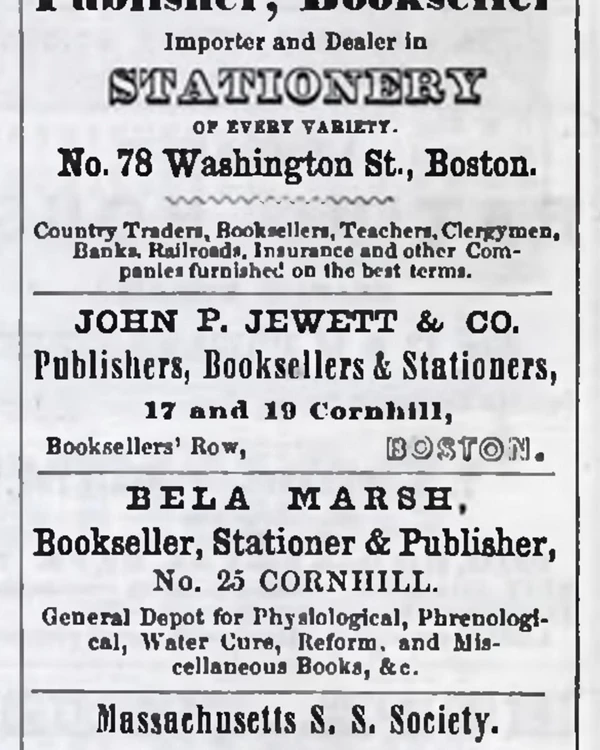Last updated: April 17, 2025
Person
John Punchard Jewett

Boston Athenaeum
Active in Boston’s abolitionist organizations, John P. Jewett greatly contributed to the movement as a publisher, printing many antislavery works—most famously, Harriet Beecher Stowe’s Uncle Tom’s Cabin.
Born in Lebanon, Maine, on August 16, 1814, John Punchard Jewett served as a bookshop apprentice in Salem, Massachusetts, before starting his own business. He worked as a bookseller and publisher first in Salem, then briefly in Cincinnati, Ohio. In 1846, Jewett moved his operations to Boston, where he specialized in publishing textbooks and religious works.1
Jewett soon immersed himself in the city’s abolition movement. In 1850, he joined the Boston Vigilance Committee, an organization created in the wake of the new federal Fugitive Slave Law. This organization assisted freedom seekers escaping slavery on the Underground Railroad. According to committee records, Jewett donated funds multiple times from 1851 to 1855 to support the group’s efforts. For example, in June 1854, Jewett gave 20 dollars to offset the legal fees of Richard Henry Dana for his defense of the rescuers of Shadrach Minkins, a freedom seeker arrested in Boston in 1851.2 In 1852, Jewett served on a committee of arrangements to organize an event marking the one-year anniversary of the rendition of Thomas Sims, the first freedom seeker caught in Boston and returned to bondage.3
Jewett also contributed to the larger abolition movement through his work as a publisher. After Jewett’s wife Harriet read chapters of Harriet Beecher Stowe’s Uncle Tom’s Cabin in the newspaper The National Era, she suggested he “put it into book form.”4 In March 1852, Jewett published the book. He kept his promise that he “would spare no pains nor expense nor effort to push the book into an unparalleled circulation.”5 Through Jewett’s vigorous advertising, the book became a phenomenon—it sold 305,000 copies by March 1853.6
Despite Jewett’s success in publishing Uncle Tom’s Cabin, Stowe grew dissatisfied with only receiving 10 percent of profits for her work. She decided to start publishing with another Boston company—Phillips, Sampson, & Co. after Jewett declined to increase her earnings in new contracts. Jewett wrote to Charles Sumner in 1854 about Stowe, believing:
She has treated me very unhandsomely. So much so that I positively refused to have anything more to do with her. She has shown great ingratitude, & a most selfish, and mercinary [sic] disposition. I will tell you the whole, at some future time, but cannot write it. She has gone to Phillips & Sampson, a pro slavery concern.7
In contrast, Stowe viewed Jewett as “overbearing—uneasy if crossed & unwilling to have fair enquiries made.”8 While the soured relationship between the two caused Jewett to not publish Stowe’s other writings, he proceeded to publish other antislavery works, such as Charles Sumner’s speeches and Charles Emery Stevens’s Anthony Burns: A History.9
The financial crisis of 1857 forced Jewett to close his publishing company. He later opened a watch factory in Roxbury after a brief stint in England. Jewett then moved to New York in 1867.
On May 14, 1884, he died in Orange, New Jersey. His remains are interred in Salem, Massachusetts.10
Footnotes
- Frederick Clarke Jewett, History and genealogy of the Jewetts of America, (New York: Grafton Press, 1908), 337; Michael Winship, “‘Yours for freedom’: John P. Jewett writes to Charles Sumner,” Harvard Library Bulletin 24 no.2 (2014): 1, https://dash.harvard.edu/server/api/core/bitstreams/98853691-9b08-45af-8f41-5894006e3fec/content; ”John Punchard Jewett,” Find a Grave, John Punchard Jewett (1814-1884) - Find a Grave Memorial.
- The Liberator, October 8, 167; "Members of the Committee of Vigilance," broadside printed by John Wilson, 1850, Massachusetts Historical Society, Austin Bearse, Remininscences of Fugitive Slave Law Days in Boston, (Boston: Warren Richardson, 1880), Reminiscences of Fugitive-slave Law Days in Boston : Austin Bearse : Free Download, Borrow, and Streaming : Internet Archive; Francis Jackson, Account Book of Francis Jackson, Treasurer The Vigilance Committee of Boston, Dr. Irving H. Bartlett collection, 1830-1880, W. B. Nickerson Cape Cod History Archives, 29, 44, 73, 85, https://archive.org/details/drirvinghbartlet19bart/page/n3/mode/2up.
- Theodore Parker, The Boston kidnapping: a discourse to commemorate the rendition of Thomas Simms, delivered on the first anniversary thereof, April 12, 1852, before the Committee of Vigilance, at the Melodeon in Boston, (Boston: John Wilson and Son, 1852), 2, https://archive.org/details/bostonkidnapping00park/page/n9/mode/2up.
- Norwich Aurora, December 8, 1869, 2.
- Claire Parfait, The Publishing History of Uncle Tom’s Cabin, 1852-2002, (London: Routledge, 2016), 64.
- Claire Parfait, The Publishing History of Uncle Tom’s Cabin, 1852-2002, (London: Routledge, 2016), 56.
- Letter from Jewett to Charles Sumner, transcribed and published by Michael Winship, “‘Yours for freedom’: John P. Jewett writes to Charles Sumner,” Harvard Library Bulletin 24 no.2 (2014): 9, https://dash.harvard.edu/server/api/core/bitstreams/98853691-9b08-45af-8f41-5894006e3fec/content.
- Claire Parfait, The Publishing History of Uncle Tom’s Cabin, 1852-2002, (London: Routledge, 2016), 44.
- Michael Winship, “‘Yours for freedom’: John P. Jewett writes to Charles Sumner,” Harvard Library Bulletin 24 no.2 (2014): 2, 21, https://dash.harvard.edu/server/api/core/bitstreams/98853691-9b08-45af-8f41-5894006e3fec/content.
- Frederick Clarke Jewett, History and genealogy of the Jewetts of America, (New York: Grafton Press, 1908), 337; ”John Punchard Jewett,” Find a Grave, John Punchard Jewett (1814-1884) - Find a Grave Memorial.
